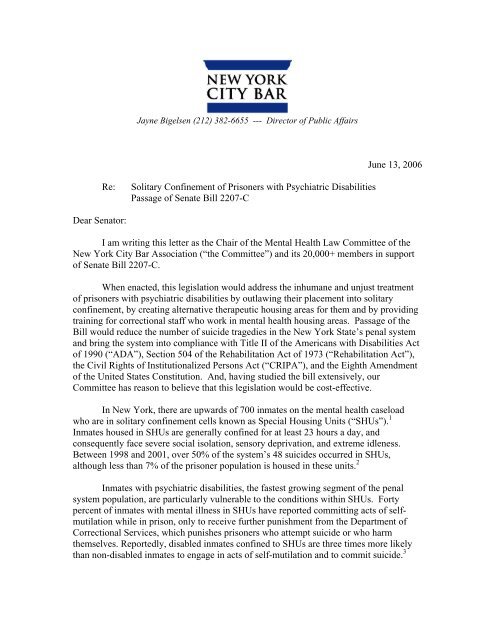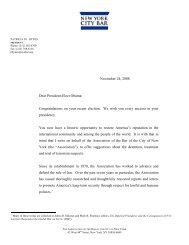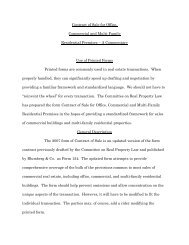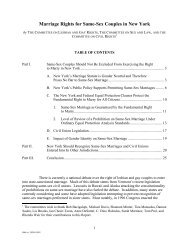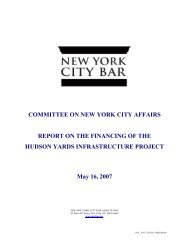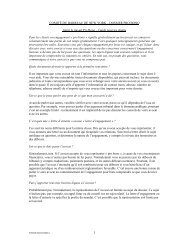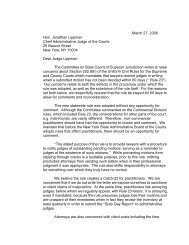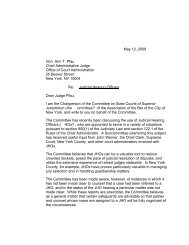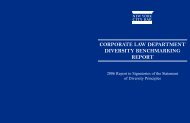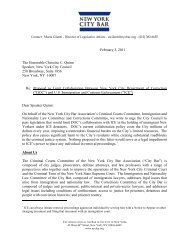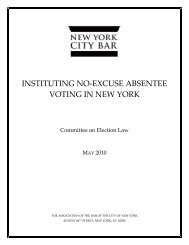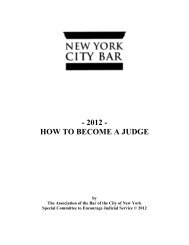Jayne Bigelsen (212) 382-6655 --- Director of Public Affairs
Jayne Bigelsen (212) 382-6655 --- Director of Public Affairs
Jayne Bigelsen (212) 382-6655 --- Director of Public Affairs
Create successful ePaper yourself
Turn your PDF publications into a flip-book with our unique Google optimized e-Paper software.
<strong>Jayne</strong> <strong>Bigelsen</strong> (<strong>212</strong>) <strong>382</strong>-<strong>6655</strong> --- <strong>Director</strong> <strong>of</strong> <strong>Public</strong> <strong>Affairs</strong><br />
June 13, 2006<br />
Re:<br />
Solitary Confinement <strong>of</strong> Prisoners with Psychiatric Disabilities<br />
Passage <strong>of</strong> Senate Bill 2207-C<br />
Dear Senator:<br />
I am writing this letter as the Chair <strong>of</strong> the Mental Health Law Committee <strong>of</strong> the<br />
New York City Bar Association (“the Committee”) and its 20,000+ members in support<br />
<strong>of</strong> Senate Bill 2207-C.<br />
When enacted, this legislation would address the inhumane and unjust treatment<br />
<strong>of</strong> prisoners with psychiatric disabilities by outlawing their placement into solitary<br />
confinement, by creating alternative therapeutic housing areas for them and by providing<br />
training for correctional staff who work in mental health housing areas. Passage <strong>of</strong> the<br />
Bill would reduce the number <strong>of</strong> suicide tragedies in the New York State’s penal system<br />
and bring the system into compliance with Title II <strong>of</strong> the Americans with Disabilities Act<br />
<strong>of</strong> 1990 (“ADA”), Section 504 <strong>of</strong> the Rehabilitation Act <strong>of</strong> 1973 (“Rehabilitation Act”),<br />
the Civil Rights <strong>of</strong> Institutionalized Persons Act (“CRIPA”), and the Eighth Amendment<br />
<strong>of</strong> the United States Constitution. And, having studied the bill extensively, our<br />
Committee has reason to believe that this legislation would be cost-effective.<br />
In New York, there are upwards <strong>of</strong> 700 inmates on the mental health caseload<br />
who are in solitary confinement cells known as Special Housing Units (“SHUs”). 1<br />
Inmates housed in SHUs are generally confined for at least 23 hours a day, and<br />
consequently face severe social isolation, sensory deprivation, and extreme idleness.<br />
Between 1998 and 2001, over 50% <strong>of</strong> the system’s 48 suicides occurred in SHUs,<br />
although less than 7% <strong>of</strong> the prisoner population is housed in these units. 2<br />
Inmates with psychiatric disabilities, the fastest growing segment <strong>of</strong> the penal<br />
system population, are particularly vulnerable to the conditions within SHUs. Forty<br />
percent <strong>of</strong> inmates with mental illness in SHUs have reported committing acts <strong>of</strong> selfmutilation<br />
while in prison, only to receive further punishment from the Department <strong>of</strong><br />
Correctional Services, which punishes prisoners who attempt suicide or who harm<br />
themselves. Reportedly, disabled inmates confined to SHUs are three times more likely<br />
than non-disabled inmates to engage in acts <strong>of</strong> self-mutilation and to commit suicide. 3
Evidence produced thus far in Disability Advocates, Inc. v. New York State<br />
Office <strong>of</strong> Mental Health (“OMH”), et al., 4 a lawsuit challenging the use <strong>of</strong> SHUs,<br />
indicates that isolated confinement tends to exacerbate a prisoner’s mental illness and<br />
prognosis, in some cases creating a significant risk <strong>of</strong> death by suicide, and that<br />
prisoners’ mental impairments prevent them from remaining free <strong>of</strong> disciplinary<br />
infractions long enough to gain release from isolation. 5 These findings are consistent with<br />
social science literature describing the tragic psychological effects <strong>of</strong> isolated<br />
confinement on prisoners more generally. 6 Additionally, the American Psychiatric<br />
Association has recommended against using SHUs for inmates who suffer from<br />
schizophrenia, and the American Association <strong>of</strong> Community Psychiatrists has asserted<br />
that isolation and enforced idleness result in further deterioration and illness.<br />
In addition to raising serious ethical questions, by failing to provide alternative<br />
punishments – punishments that do not exacerbate mental illness – as a reasonable<br />
accommodation to mentally disabled prisoners, the government discriminates against<br />
these prisoners solely on the basis <strong>of</strong> their disabilities in violation <strong>of</strong> the ADA and the<br />
Rehabilitation Act. The ADA provides that “no qualified individual with a disability<br />
shall, by reason <strong>of</strong> such disability, be excluded from participation in or be denied the<br />
benefits <strong>of</strong> the services, programs, or activities <strong>of</strong> a public entity, or be subjected to<br />
discrimination by any such entity.” 7 The Rehabilitation Act places the same prohibition<br />
on “any program or activity receiving Federal financial assistance . . . .” 8 By neglecting<br />
to accommodate the special needs <strong>of</strong> inmates with serious mental illnesses, New York<br />
State clearly deprives them <strong>of</strong> access to programs and services available in the general<br />
prisoner population, simply because they are too disabled to remain in the general<br />
population under current disciplinary policies. Passage <strong>of</strong> S2207-C would correct this<br />
illegality. Further, like the ADA and Rehabilitation Act, the CRIPA aims to protect the<br />
rights <strong>of</strong> disabled individuals, with a particular focus on conditions <strong>of</strong> confinement. The<br />
statute authorizes the Attorney General to conduct investigations and file suit in order to<br />
secure the federal rights <strong>of</strong> confined persons, including those in state prisons and mental<br />
health facilities. 9 Accordingly, the Committee calls upon State legislators to uphold<br />
CRIPA’s federal mandate to ensure the safety <strong>of</strong> disabled individuals in prisons by<br />
eliminating the SHU.<br />
Moreover, by subjecting disabled individuals to prolonged periods <strong>of</strong> isolated<br />
confinement with deliberate indifference to their health needs, the government may<br />
violate the right <strong>of</strong> prisoners with mental illness to be free from cruel and unusual<br />
punishment as guaranteed by the Eighth Amendment <strong>of</strong> the United States Constitution.<br />
In New York, there is no limit on the length <strong>of</strong> time a prisoner can be sentenced to SHU.<br />
On average, inmates with psychiatric disabilities are sentenced to SHU for 38 months –<br />
seven times longer than prisoners without mental health care needs. 10 According to the<br />
United States Supreme Court, both the treatment a prisoner receives and the conditions <strong>of</strong><br />
a prisoner’s confinement fall within the protective parameters <strong>of</strong> the Eighth<br />
Amendment. 11 Within this context, the Supreme Court has held that mere knowledge <strong>of</strong> a<br />
serious risk <strong>of</strong> injury constitutes deliberate indifference to the welfare <strong>of</strong> an individual<br />
and is thereby violative <strong>of</strong> the Eighth Amendment. 12 Given the long-established mental<br />
health risks <strong>of</strong> prolonged solitary confinement, the government has surely exhibited
deliberate indifference in the confinement <strong>of</strong> disabled inmates to SHU. The State<br />
Legislature must not passively allow such constitutional violations to persist.<br />
Finally, the Committee urges you to help enact bill S2207-C because its<br />
implementation would save the State money and alleviate harm to the public by<br />
eliminating the costly negative consequences <strong>of</strong> SHU confinement. First, the<br />
discontinuance <strong>of</strong> using SHUs on prisoners with psychiatric disabilities would protect the<br />
State from the expense <strong>of</strong> defending against lawsuits under the aforementioned laws.<br />
Second, it would reduce the costs associated with releasing prisoners who, due to neglect<br />
and inadequate treatment, are more ill than when they were first incarcerated and<br />
therefore more likely to experience homelessness, less likely to seek mental health care in<br />
the community, and, accordingly, more likely to require continued government services<br />
and to return to prison. Third, the provision <strong>of</strong> appropriate mental health treatment to<br />
inmates with psychiatric disabilities would reduce costs stemming from disruptive<br />
behavior and the injury psychiatrically disabled inmates inflict upon themselves and<br />
correction <strong>of</strong>ficers. Relatedly, inmates who receive the necessary treatment are more<br />
likely to be released sooner and thereby to save the government the expense <strong>of</strong><br />
maintaining them in prison<br />
For the above-stated reasons, the Committee respectfully recommends the passage<br />
<strong>of</strong> S2207-C; a bill to eliminate the use <strong>of</strong> cruel and inhumane SHUs in lieu <strong>of</strong> effective<br />
mental health services, not only as a matter <strong>of</strong> ethical obligation, but also in furtherance<br />
<strong>of</strong> established legal mandates protecting the rights <strong>of</strong> disabled individuals and in the<br />
name <strong>of</strong> fiscal responsibility and public safety.<br />
With your leadership, New York will join other states in this critically important<br />
step toward improving the treatment and preserving the rights <strong>of</strong> prisoners with<br />
psychiatric disabilities. The Committee looks forward to learning <strong>of</strong> your progress on<br />
this important matter and my colleagues and I are available to meet with you and staff<br />
should you wish to receive more information regarding our research on this subject.<br />
Respectfully submitted,<br />
Virginia K. Trunkes, Esq.<br />
Chair, Committee on Mental Health Law<br />
Committee on Mental Health Law<br />
Virginia K. Trunkes (Chair)<br />
Peter Yoerg (Secretary)
Craig Acorn<br />
Susan Canter<br />
Kevin Cremin<br />
Bill Estes<br />
Ed Geffner<br />
John Gresham<br />
Fred A. Levine<br />
Abigail Levy<br />
Martin Tom Murphy<br />
Cathy Potler<br />
Noah Potter<br />
Judith Scholl<br />
David Spanier<br />
Claire B. Steinberger<br />
Vuka Stricevic*<br />
Brian Tong<br />
Kimberly Tate-Brown<br />
S<strong>of</strong>ia Yakren*<br />
* Authors <strong>of</strong> the letter<br />
1. Correctional Association <strong>of</strong> New York, Mental Health in the House <strong>of</strong> Corrections, June, 2004<br />
2. http://www.correctionalassociation.org/PVP/publications/SHU-fact.pdf<br />
3. Correctional Association <strong>of</strong> New York, Mental Health in the House <strong>of</strong> Corrections, June, 2004.<br />
4. No. 02-4002 (S.D.N.Y. filed May 28, 2002).<br />
5. Declaration <strong>of</strong> Terry A. Kupers, MD, MSP, Disability Advocates, Inc. v. OMH, et al., No. 02-<br />
4002 (S.D.N.Y. filed March 6, 2006) 11-12 (issued upon his inspection <strong>of</strong> 13 New York Department <strong>of</strong><br />
Corrections (“DOC”) prisons to assess treatment services for mentally disabled prisoners at the request <strong>of</strong><br />
Disability Advocates, Inc.). Dr. Kupers is an Institute Pr<strong>of</strong>essor in the Graduate School <strong>of</strong> Pscyhology at<br />
Wright Institute in Berkeley, a staff member <strong>of</strong> Alta Bates Medical Center in Berkeley, and a Diplomate <strong>of</strong><br />
the American Board <strong>of</strong> Psychiatry & Neurology. Id. 1. His committee positions and publications<br />
demonstrate expertise on the topic <strong>of</strong> prisoners with mental illness. Id. 1-3. For purposes <strong>of</strong> the<br />
assessment, Dr. Kupers interviewed 183 prisoners (nearly all on the Office <strong>of</strong> Mental Health caseload),<br />
inspected various prison housing units, and reviewed a large volume <strong>of</strong> documents, including clinical charts<br />
and custody files <strong>of</strong> almost all <strong>of</strong> the 183 prisoners interviewed, as well as additional cartons <strong>of</strong> clinical<br />
files <strong>of</strong> prisoners who committed suicide. Id. 8-9.<br />
6. See, e.g., Hans Toch, MEN IN CRISIS: HUMAN BREAKDOWN IN PRISONS (Aldine 1975); Craig<br />
Haney, Mental Health Issues in Long-Term Solitary and ‘Supermax’ Confinement, in CRIME &<br />
DELINQUENCY (2003).<br />
7. 42 U.S.C. § 12132.
8. 29 U.S.C. § 794(a).<br />
9. 42 USC § 1997 et seq.<br />
10. http://www.correctionalassociation.org/PVP/publications/SHU-fact.pdf<br />
11. Helling v. McKinney, 509 U.S. 25, 31 (1993).<br />
12. Farmer v. Brennan, 511 U.S. 825, 836 (1994); Estelle v. Gamble, 429 U.S. 97, 104 (1976).


